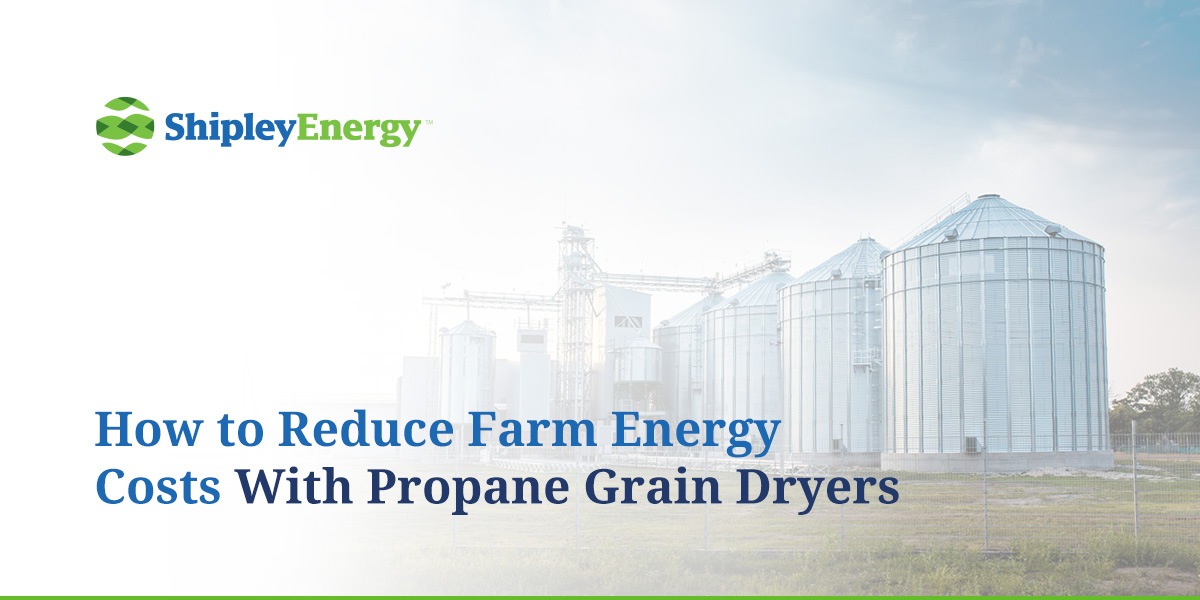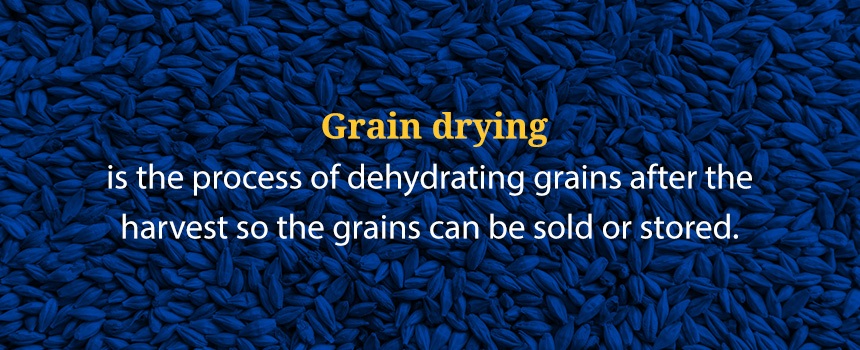

Running a farm takes a lot of energy — and not just for the farmers. Trucks and machinery guzzle up fuel, and a farm’s electricity can power everything from milking machines to heating and cooling systems to computers.
All that energy use adds up fast. For many farm businesses, energy costs can account for 7 to 16% of a farm’s total expenditures. But one way to reduce farm energy costs is through the use of propane grain dryers.
Propane grain dryers offer an array of benefits to any farming operation — flexibility in harvesting time, decreased loss, increased efficiency, reduced costs, and more. Below, we’ll explain a little bit about what propane grain dryers are, how they work, and why they’re so good for farms.

In agriculture, grain drying is the process of dehydrating grains after the harvest so the grains can be sold or stored.

All grains contain a certain amount of water. Corn, for example, typically contains 30% water when it is ripe and growing in the cornfield. Farmers typically let their crops dry a little in their fields, but when they harvest their crops, the crops still generally contain a significant amount of water. At this point, corn usually contains 23 to 25% water — this amount of water makes for robust, firm-standing stalks and easy-to-shell kernels. For soybeans, the ideal water composition is about 13 to 15% water when the plants are harvested. More water and the beans can easily be bruised or damaged. Less water and the beans become hard and brittle and may crack during harvesting.
One effect of this water composition is that it makes the crops heavy. Water weighs about 8.3 pounds per gallon, and with plentiful harvests, even minuscule amounts of water will quickly add up. Grain drying helps eliminate much of this excess water.
Many types of grain dryers exist. Some are natural-air or low-temperature dryers, where grain can take several weeks to dry, while high-temperature bin dryers can process up to 1,000 bushels in an hour. Other grain dryers work by heating air and then using massive fans to push the air through the grain or using augers instead of forced air. Augers are useful for increasing efficiency by ensuring that the grain dries evenly.
Many of these dryers use propane for power, though some use natural gas. And a few farmers are experimenting with 100% solar-powered grain dryers for superior eco-friendliness.
Farmers can have their grains dried at the grain elevator or farm cooperative, or they can dry their grains on the farm. But why is grain drying important? Below are some of the benefits of using propane grain dryers:








Grain drying uses a lot of energy, so knowing how to control grain-drying costs is essential. Fortunately, farmers have a few options for cutting their grain-drying expenses:
One economical way to heat smaller bins of grain is to use the all-heat mode. The all-heat mode heats the grain in the dryer, and then the grain comes out hot and cools gradually in the bin. The cooling process removes moisture from the grain, so drying takes less time and consumes less energy, leading to reductions of 20 to 30% in operating costs. Using the all-heat mode also leads to greater efficiency because the hot air moves through the dryer at a higher rate. The all-heat mode also leads to higher-quality grain because the slow cooling of the kernels leads to fewer stress cracks.
If using the all-heat function on your existing dryer isn’t practical, consider investing in a specialized all-heat dryer. An all-heat dryer is an economical way to increase your all-heat-drying capacity and efficiency.
Tower dryers, centrifugal dryers, centrifugal stack dryers, and other newer models offer these options, though these dryer models can be expensive upfront. In these processes, the heat given off by the hot, cooling grain is recovered and recycled back into subsequent drying processes. Recycling the heat helps cool the grain and leads to more efficiency by reducing the amount of fuel required to dry the grain.
If your grain is drying unevenly, your dryer will waste energy in heating the kernels that are already dry while trying to dry the kernels that are still wet. This excessive drying leads to overconsumption of fuel, high costs, and a lowered quality of grain. To dry your grain more evenly, try using a stacked dryer, tower dryer, or grain inverter. These systems have mechanisms in place to move the grain around inside the equipment to give it even heat exposure.
Though it might seem that raising the drying temperature would increase costs, operating on higher heat reduces drying time and helps you save on energy costs. Excessively high heat can damage grain, though, so use this method with care. The best and most fuel-efficient temperatures are usually between 210 and 230 degrees Fahrenheit.

It’s essential to perform preventative maintenance at the beginning of the season to ensure that your equipment is ready to go. Proper maintenance includes checking the dryer columns for blockages and making sure the burner is clean and functioning as it should. Inspect your fans and belt drives too, and calibrate your moisture and temperature sensors. During the harvest, it’s also a good idea to empty and clean the dryer at regular intervals. This routine maintenance will help keep your grain dryer running efficiently.
Before putting your grain through the dryer, make sure it is clean. Dirt and chaff can impede airflow, and impeded airflow can make the grain dryer run less efficiently.
As we mentioned above, overdrying grain can diminish its quality. Overdrying also reduces efficiency by using more fuel — and as grain gets dryer, it requires even more energy to dry, so you use even more fuel. Grain needs to be dried so it can be stored safely without rotting, but a small amount of moisture is safe to leave in the grain.
One of the best ways to avoid overdrying your grain is to monitor your system remotely. Many drying systems offer convenient, user-friendly monitoring from a laptop, tablet, or smartphone. You can adjust different settings, like the temperature and moisture control settings, and you can make sure your dryer hasn’t unexpectedly stopped running.
Air from the fan should be able to move freely — if not, some of the energy used to power the fan will be wasted. The area the air flows through should be wider than the fan itself.
Though remote monitoring provides enormous benefits and convenience, it’s crucial to monitor your moisture controls by pulling samples. That way, you’ll know your dryer is functioning as it should. Try to pull samples from your dryer two or three times a day and check their moisture content. Moisture sensors in grain dryers can be finicky, and you never know what can cause them to over- or under-dry your grain.
Different varieties of corn dry at different speeds. The same varieties can even vary in their rate of drying from year to year. When you put a new hybrid in the dryer, be sure to keep a close eye on it so that it doesn’t unexpectedly overdry and cause you to burn through fuel.
A professional energy auditor can inspect your system with a trained eye, identify inefficiencies, and make recommendations for improvements or upgrades.
Propane offers many benefits for farmers who use grain dryers:









The Propane Education and Research Council (PERC) provides funds for farmers through the Propane Farm Incentive Program. Through this program, farmers can receive rebates in exchange for supplying PERC with photographs and data — such as hours in use, fuel consumption, and cost savings — to document the performance of their propane-fueled machinery.
The Propane Farm Incentive Program helps make propane grain drying more affordable for farmers. Along with the reasonable cost of propane and the grain dryers themselves, this incentive program helps make propane-powered crop dryers an economical option for agricultural operations of all types.
Shipley Energy supplies propane for residential, commercial, and agricultural use. When you partner with us for propane crop drying, you’ll get competitive pricing, efficient and reliable fuel, and convenient delivery services that help make the hard work of growing America’s food a little easier.
More than that, you’ll get caring and knowledgeable services. When you call us for help, we know you’re looking for good advice, and that’s exactly what we’ll give. We value our simple, trusted relationships with our customers and wouldn’t settle for anything less.
Get in touch with us today to schedule a farm propane delivery or to learn more about our farmers’ propane. Contact us online, or call us at 855-743-0557.
